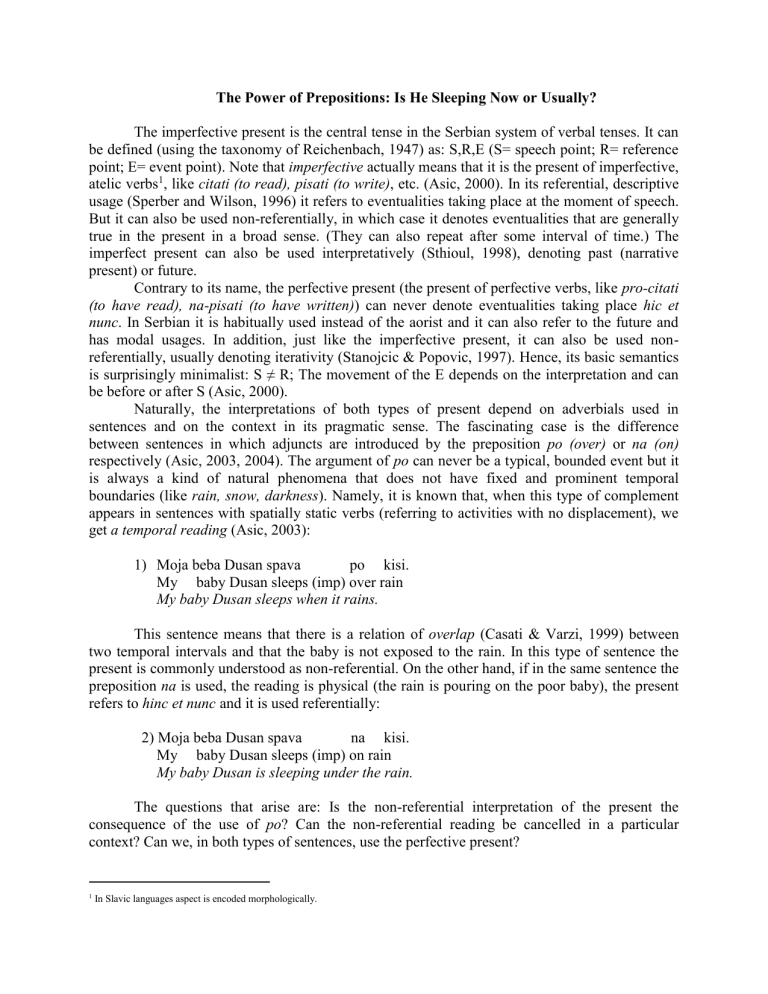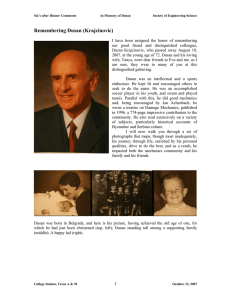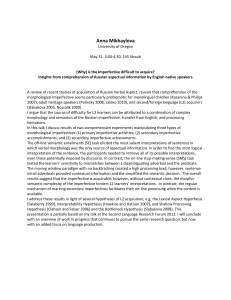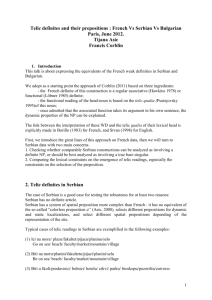The power of prepositions: Is he sleeping now or usually

The Power of Prepositions: Is He Sleeping Now or Usually?
The imperfective present is the central tense in the Serbian system of verbal tenses. It can be defined (using the taxonomy of Reichenbach, 1947) as: S,R,E (S= speech point; R= reference point; E= event point). Note that imperfective actually means that it is the present of imperfective, atelic verbs
1
, like citati (to read), pisati (to write) , etc. (Asic, 2000). In its referential, descriptive usage (Sperber and Wilson, 1996) it refers to eventualities taking place at the moment of speech.
But it can also be used non-referentially, in which case it denotes eventualities that are generally true in the present in a broad sense. (They can also repeat after some interval of time.) The imperfect present can also be used interpretatively (Sthioul, 1998), denoting past (narrative present) or future.
Contrary to its name, the perfective present (the present of perfective verbs, like pro-citati
(to have read), na-pisati (to have written) ) can never denote eventualities taking place hic et nunc . In Serbian it is habitually used instead of the aorist and it can also refer to the future and has modal usages. In addition, just like the imperfective present, it can also be used nonreferentially, usually denoting iterativity (Stanojcic & Popovic, 1997). Hence, its basic semantics is surprisingly minimalist: S ≠ R; The movement of the E depends on the interpretation and can be before or after S (Asic, 2000).
Naturally, the interpretations of both types of present depend on adverbials used in sentences and on the context in its pragmatic sense. The fascinating case is the difference between sentences in which adjuncts are introduced by the preposition po (over) or na (on) respectively (Asic, 2003, 2004). The argument of po can never be a typical, bounded event but it is always a kind of natural phenomena that does not have fixed and prominent temporal boundaries (like rain, snow, darkness ). Namely, it is known that, when this type of complement appears in sentences with spatially static verbs (referring to activities with no displacement), we get a temporal reading (Asic, 2003):
1) Moja beba Dusan spava po kisi.
My baby Dusan sleeps (imp) over rain
My baby Dusan sleeps when it rains.
This sentence means that there is a relation of overlap (Casati & Varzi, 1999) between two temporal intervals and that the baby is not exposed to the rain. In this type of sentence the present is commonly understood as non-referential. On the other hand, if in the same sentence the preposition na is used, the reading is physical (the rain is pouring on the poor baby), the present refers to hinc et nunc and it is used referentially:
2) Moja beba Dusan spava na kisi.
My baby Dusan sleeps (imp) on rain
My baby Dusan is sleeping under the rain.
The questions that arise are: Is the non-referential interpretation of the present the consequence of the use of po ? Can the non-referential reading be cancelled in a particular context? Can we, in both types of sentences, use the perfective present?
1
In Slavic languages aspect is encoded morphologically.
In this paper I also compare the situation in Serbian with the one in Bulgarian (a South-
Slavic language as well) and the situation in Kikuyu (a Bantu language spoken in Kenya).
Interestingly, in Bulgarian the opposition between a physical reading and a temporal reading is created thanks to the opposition between the presence –and the absence of the definite article: in the first case the present is understood as referential and in the second as non-referential.
As for Kikuyu, the same opposition is created thanks to the usage of the preposition – conjunction na (with, and ). But one peculiar aspect of this language is the existence of markers
(morphemes) for different kinds of present (referential and non-referential).
References:
A SIC T. (2000), « Le présent perfectif en serbe : temps, mode ou puzzle ?
» Cahiers de Linguistique Française 22,
275-294.
A SIC T. (2003), « The po-na-u opposition in Serbian an its Equivalents in some Slavic languages and Kikuyu »; in ed. by P. Kosta, J. Blaszczak, J. Frasek, Lj. Geist, M. Zygis . Investigation into Formal Slavic Linguistics, Frankfurt,
Peter Lang, p. 783-797
A SIC T. (in print), « The po-na-u opposition in Serbian an its Equivalent in Bulgarian »; in Balkanistica 17, The
University of Mississippi
C ASATI R. & V ARZI A. (1999), Parts and places: The structure of Spatial Representation , Cambridge (Mass.), The
MIT Press.
R EICHENBACH H. (1947), Elements of Symbolic Logic, New York, Free Press.
S PERBER D.
& W ILSON D. (1986), Relevance. Communication and Cognition, Oxford, Blackwell.
S TANOJCIC Z..
& P OPOVIC L J . (1997), Gramatika srpskog jezika, Beograd, ZUNS.
S THIOUL B. (1998), Temps verbaux et point de vue
»; in
: M OESCHLER J.
ET AL .,
Le temps des événements
, Pqris,
Kimé, 197-220











